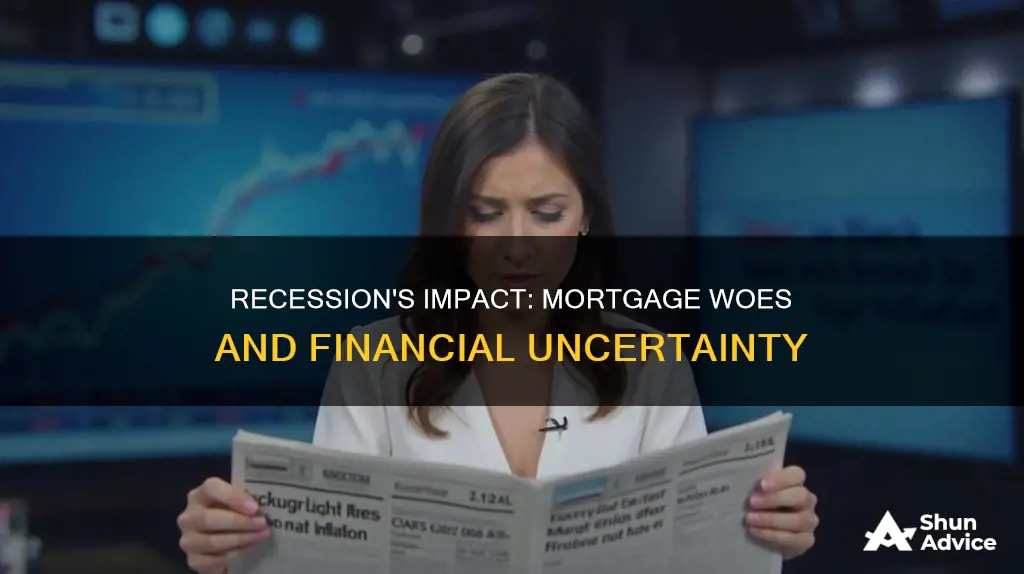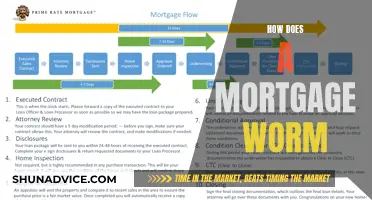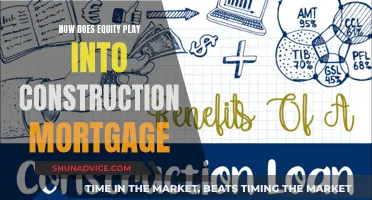
A recession is a period of economic downturn, which can have a significant impact on mortgages and the housing market. Typically, a recession involves a serious drop in economic activity, which can translate to job losses or reduced income for many. This can make it difficult for people to keep up with their mortgage payments, and the risk of default increases. During a recession, mortgage rates tend to decrease, and home prices often drop, which can be good news for buyers. However, it is essential to proceed with caution as lenders may tighten eligibility requirements, making it more challenging to obtain a mortgage. Understanding the potential risks and seeking guidance from lenders or financial advisors is crucial when navigating mortgages during a recession.
What You'll Learn

Adjustable-rate mortgages are riskier in a recession
A recession is a period of declining economic activity, typically defined as two consecutive quarters of falling gross domestic product (GDP). During a recession, financial risks increase, including the risk of default, business failure, job losses, and bankruptcy. As a result, taking on new debt during a recession is generally not recommended.
Adjustable-rate mortgages (ARMs) are riskier in a recession due to their variable nature. While ARMs may offer a lower introductory interest rate, the rate is subject to change over the life of the loan. This means that if interest rates rise during or after a recession, the borrower's monthly payments can increase significantly. In contrast, fixed-rate mortgages provide stability and allow borrowers to lock in their monthly payments, regardless of fluctuations in the market.
During a recession, interest rates initially fall as central banks try to stimulate the economy. However, once the economy starts to recover, interest rates tend to rise again. This can negatively impact borrowers with adjustable-rate mortgages as their monthly payments may increase. On the other hand, fixed-rate mortgages at recession pricing could be a better long-term deal.
Additionally, the lending standards for ARMs have become stricter since the Great Recession. Borrowers may now need to meet higher qualifications and provide proof of income and assets, making it more challenging to obtain an ARM. The savings associated with ARMs may also be less beneficial than they once were due to changing regulations and the potential for prepayment penalties.
Overall, while ARMs can be useful in certain scenarios, such as when a borrower knows they will not be staying in their home for an extended period, they carry greater financial risk during a recession due to the potential for rising interest rates and the resulting increase in monthly payments.
Renegotiating Your Mortgage: Strategies for Success
You may want to see also

Homeowners may struggle to make mortgage payments
A recession can cause financial hardship for many people, including homeowners. During a recession, unemployment tends to rise, and incomes may decrease. This can make it difficult for homeowners to keep up with their mortgage payments. If a homeowner loses their job or experiences a reduction in income, they may struggle to pay their mortgage, leading to potential late payments or even foreclosure.
Homeowners with adjustable-rate mortgages (ARMs) may be particularly vulnerable during a recession. When the Federal Reserve lowers interest rates to stimulate the economy, the cost of borrowing decreases. While this can benefit those with fixed-rate mortgages, those with adjustable-rate mortgages may see their monthly payments increase once the recession ends and interest rates rise again.
Additionally, during a recession, mortgage lenders may tighten their eligibility requirements, making it more challenging for borrowers to qualify for loans or refinance their existing mortgages. Homeowners who need to refinance to take advantage of lower interest rates may find it difficult to do so if their financial situation has deteriorated.
To manage their mortgage payments during a recession, homeowners can consider the following options:
- Contact their mortgage servicer or lender: Many companies are willing to work with borrowers to avoid late payments and foreclosure. Options may include forbearance, where the lender temporarily suspends or reduces payments.
- Create a household budget: Budgeting can help homeowners navigate their finances during a recession and adjust their spending habits.
- Explore mortgage relief options: Depending on the region and the economic climate, special measures may be in place to assist homeowners, such as suspending or reducing payments or postponing foreclosure.
Understanding Mortgage Balance Increase: What You Need to Know
You may want to see also

Lenders may be able to help those in financial trouble
During a recession, lenders may be able to help those facing financial hardship. If you are unable to make your mortgage payments, your first step should be to contact your mortgage servicer or lender. The companies that manage mortgages are aware that life can be unpredictable and are often willing to work with borrowers to avoid late payments and foreclosure. The sooner you can reach out to your lender, the better; you may have more options the earlier you contact them. Depending on your situation and the policies offered by the servicer or lender, mortgage relief options might include forbearance, where a mortgage lender or servicer temporarily suspends or reduces your mortgage payments while you get your finances in order.
It is important to note that these suspended or reduced payments will not be wiped out and you will be required to pay them at a later date. Additionally, during a recession, it is easy to overlook the need to create a household budget. However, a budget can help you navigate economic downturns and adjust your spending habits. It is simple to set up a budget using paper and pencil, a spreadsheet, or a budget app. At the end of every month, compare your expenses with your budget and make the necessary adjustments to cut back or increase your savings.
During a recession, interest rates usually fall at first and then rise as the economy recovers. This means that the adjustable rate for a loan taken out during a recession is likely to rise once the downturn ends. A fixed-rate loan at recession pricing could be a more financially viable option in the long run. While interest rates usually fall early in a recession, credit requirements are often stricter, making it challenging for some borrowers to qualify for the best interest rates and loans.
If you are unable to make your mortgage payments, it is important to understand what help is available. In some situations, a mortgage lender or servicer might be prohibited from foreclosing on your home. For example, foreclosures were banned through June 30, 2021, for homeowners with federally backed mortgages who were financially impacted by the coronavirus pandemic. Check with your mortgage servicer or lender about its foreclosure rules. If you cannot arrange forbearance but have good credit, you may be able to ease your financial situation by refinancing your mortgage. Mortgage interest rates tend to fall during recessions, and refinancing could result in a lower monthly payment that makes it easier to meet your financial obligations.
Mortgage Officers: Strategies for Finding Quality Leads
You may want to see also

Recessions can make it harder to borrow money
During a recession, the Federal Reserve will adjust the target federal funds rate to drive down mortgage rates and encourage borrowing. When rates are lowered, borrowing costs across the economy should drop, including mortgage rates. However, with mortgages, you'll see the impact of anticipated actions rather than having them show up after the Fed has made a move because mortgages are generally sold in the bond market a couple of months after the loan closes.
The Federal Reserve lowers the target range because cheaper borrowing encourages spending, which gives the economy a boost. The combination of lower interest rates and potentially lower housing prices can bring homes that were out of reach before the recession within reach. In real estate lingo, a buyer's market occurs when there are more houses on the market than there are buyers. Supply exceeds demand with houses often listed at bargain prices.
However, it is important to note that the impact of a recession on mortgage rates and housing prices can vary depending on the specific circumstances and market conditions. For example, the 2008 recession saw a more extreme decline in home prices compared to the temporary dip observed during the 2020 recession.
Understanding Mortgages: How Do They Work and Why?
You may want to see also

Recessions can be a good time to buy or refinance a home
While the cost of financing a home increases when interest rates are on the rise, home prices themselves may actually decline during a recession. This is because demand slows and values of homes come down, with fewer people competing for the same inventory of homes. Sellers may have to settle for less than their initial asking price, which can be good news for hopeful homebuyers.
A recession may also be a good time to lock in a lower fixed rate on a mortgage refinance if you qualify. However, it is important to be cautious about taking on new debt until you see signs that the economy is recovering. During a recession, the risk of job loss increases, and you may have to take a job that pays less than your previous salary, which could affect your ability to pay your debt.
Additionally, during a recession, there may be more homes available for fewer buyers. This is because some homeowners may become unable to afford their mortgage payments and need to sell. However, it is important to note that borrowing can also become more difficult during a recession, as credit requirements tend to be stricter.
Overall, if your finances are relatively steady and secure, a recession can be a good time to buy or refinance a home. You may be able to take advantage of reduced demand and get a good deal on a home or lock in a lower interest rate on a mortgage refinance. However, if your financial future is less predictable, the risk of buying a home or taking on new debt during a recession may be too high.
Missouri Mortgage Recording: A Step-by-Step Guide
You may want to see also
Frequently asked questions
If you find yourself unable to make your mortgage payments, your first step should be to contact your mortgage servicer or lender. Companies that manage mortgages are often willing to work with borrowers to avoid late payments and foreclosure. Depending on your situation and the policies offered by the servicer or lender, mortgage relief options might include forbearance, which is when a mortgage lender or servicer suspends or reduces your mortgage payments for a certain period of time while you get your finances back in order.
Recessions tend to result in a less competitive housing market and lower home prices. During a recession, mortgage rates tend to decrease. To stimulate the economy, the Federal Reserve will adjust the target federal funds rate to drive down mortgage rates and encourage borrowing. When rates are lowered, borrowing costs across the economy should drop, and this holds for mortgage rates.
Getting a mortgage can be more difficult during a recession because mortgage lenders will tighten eligibility requirements. During a recession, you may need a higher credit score and make a larger down payment to qualify. In addition, you may be approved for a smaller home loan than you would during better economic conditions.







